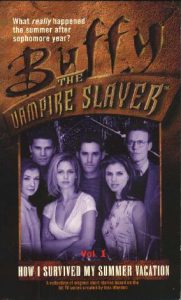“How I Survived My Summer Vacation” (August 2000) is the only “Buffy” young-adult book that’s an essential read for all “Buffy” book fans, and it’s the first book that fits so nicely with the TV continuity that it can be considered unambiguously canonical. The full title includes “Volume 1” at the end, which suggests Pocket Books planned to delve into more summers between TV seasons. That didn’t happen, unfortunately (although the comics sometimes explored the summers), but at least this tome covers the summer between Seasons 1 and 2, which is a rich playground for fresh stories.
The six short stories, told chronologically, make for an excellent way to chronicle the summer of 1997. Buffy is staying with her dad in Los Angeles, and – other than a few phone conversations with Giles and a postcard to Willow – doesn’t interact with her friends. This format allows us to check in with Buffy in two stories and with the Sunnydale gang in the other three (although we do miss Cordelia, who is on vacation in Italy).
In “When She Was Bad” (2.1), Hank tells Joyce that Buffy was “just … I don’t know. Distant. Not brooding, or sulking, just … there was no connection. All on the surface.” This doesn’t bode well for storytelling, yet the two Buffy yarns – Michelle West’s “Dust” and Cameron Dokey’s “No Place Like …” – keep the Slayer in that emotional space while still telling excellent stories.
In “Dust,” Buffy is cursed with images of the deaths of the people she touches. Without doing a strict novelization of “Prophecy Girl” (1.12), West digs into how Buffy is hard on herself for having “died.” We also feel the 1997-ness of the piece; this was a time before cellphones and easy email (Hank doesn’t have a home computer, let alone dial-up), when you truly could miss your friends when you were physically distant.
This vibe carries into Dokey’s yarn, which reminds me of “Are You Now or Have You Ever Been” (“Angel” 2.2), where Angel is reluctantly drawn into helping someone. “No Place Like …” marks a rare tale where Buffy performs a magic spell, rather than Giles or Willow. Doing double duty, Dokey also writes “Looks Can Kill,” a Sunnydale-based shapeshifter story that nicely balances the terror and mistaken-identity humor that comes from such a villain.
The authors take heed of Xander’s comment in “When She Was Bad” that “Our summer was kinda yawnworthy. Our biggest excitement was burying the Master.” In typical Nancy Holder fashion, “Absalom Rising” ends up being such a grand story that Xander’s comment seems like an understatement, with Giles apartment suffering massive damage in a fight with the Master’s followers before the Scoobies successfully bury the bones.
The first part of Xander’s statement poses a challenge that the writers embrace: In Holder’s story, on pages 85-86, Giles, Jenny and Angel agree that they will take up patrolling duties for the summer, shielding Xander and Willow from the chore. This fascinating relationship triangle (Jenny has a secret, and Giles and Angel are wary of each other) carries into the following three stories. It’s capped off with humorous effect in Paul Ruditis’ “The Show Must Go On,” where Giles, Jenny and Angel stake the vampire members of a traveling theater troupe one by one while Willow and Xander – scrambling backstage as their crewmates get decimated – remain in the dark.
The one time “Summer Vacation” pushes continuity credulity is in Yvonne Navarro’s “Uncle Dead and the Fourth of July.” Jenny and Giles go on a date to Sunnydale’s Independence Day festivities, with Giles happy to be with Jenny but not enamored of the patriotic hullabaloo. They kiss on the lips at one point. This seems to put them further along their relationship path than in “Some Assembly Required” (2.2), where Giles is nervous to ask Jenny out and they go on what is implied to be their first date.
However, “Summer Vacation” does send Jenny out of town a couple times, something that fits with the revelation later in Season 2 that she’s been keeping in touch with her gypsy tribe about her mission to restore Angel’s soul.
After reading these six short stories, we have a good sense of what the gang did over the summer; Xander’s fishy line about it being uneventful remains justified; we see the growing bond between Giles and Jenny (even if it’s arguably taken too far); and we feel closer to Buffy than the surrounding TV episodes allowed us to be. I miss Cordelia somewhat, but it’s great to see underexplored relationships such as Buffy-Hank and Giles-Jenny-Angel get the spotlight.
Click here for an index of all of John’s “Buffy” and “Angel” reviews.


